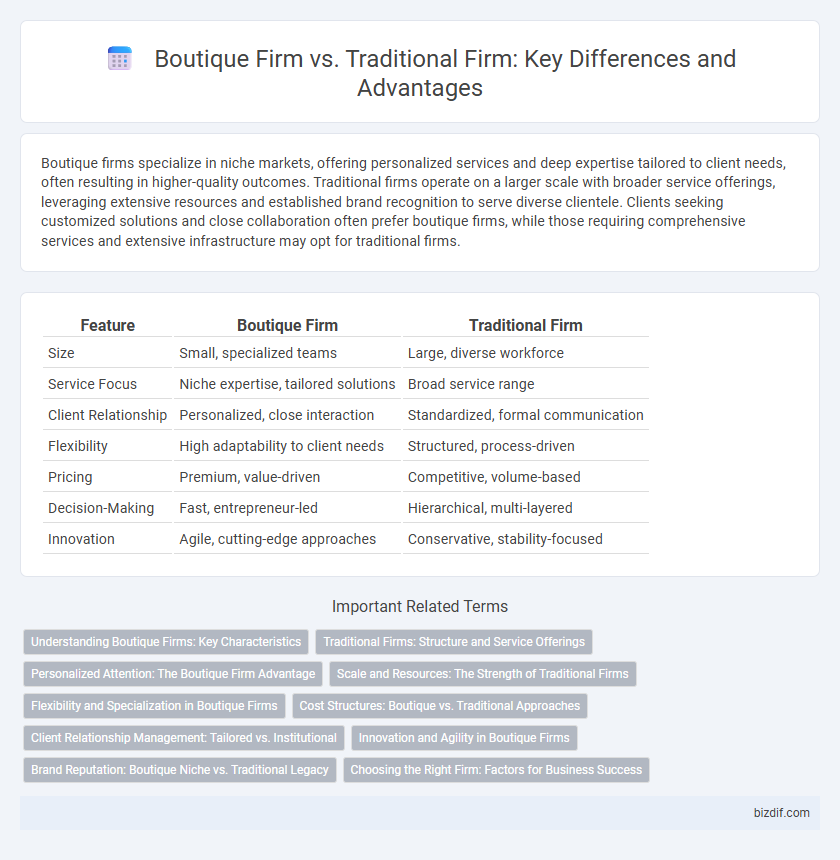Boutique firms specialize in niche markets, offering personalized services and deep expertise tailored to client needs, often resulting in higher-quality outcomes. Traditional firms operate on a larger scale with broader service offerings, leveraging extensive resources and established brand recognition to serve diverse clientele. Clients seeking customized solutions and close collaboration often prefer boutique firms, while those requiring comprehensive services and extensive infrastructure may opt for traditional firms.
Table of Comparison
| Feature | Boutique Firm | Traditional Firm |
|---|---|---|
| Size | Small, specialized teams | Large, diverse workforce |
| Service Focus | Niche expertise, tailored solutions | Broad service range |
| Client Relationship | Personalized, close interaction | Standardized, formal communication |
| Flexibility | High adaptability to client needs | Structured, process-driven |
| Pricing | Premium, value-driven | Competitive, volume-based |
| Decision-Making | Fast, entrepreneur-led | Hierarchical, multi-layered |
| Innovation | Agile, cutting-edge approaches | Conservative, stability-focused |
Understanding Boutique Firms: Key Characteristics
Boutique firms specialize in providing highly personalized services within niche markets, emphasizing expertise and tailored client relationships over scale. These firms typically maintain a smaller team of seasoned professionals, enabling greater agility and direct client engagement compared to traditional firms. Their focused approach allows for deep industry knowledge, bespoke solutions, and enhanced client satisfaction.
Traditional Firms: Structure and Service Offerings
Traditional firms typically feature hierarchical organizational structures with multiple departments specializing in diverse service lines, enabling comprehensive offerings across industries. Their service portfolios often include a wide range of standardized solutions such as consulting, auditing, legal counsel, and financial advisory to cater to broad market demands. Established client relationships and extensive resources support these firms in managing large-scale projects and delivering integrated services efficiently.
Personalized Attention: The Boutique Firm Advantage
Boutique firms excel in providing personalized attention by focusing on a select group of clients, ensuring tailored services that align closely with individual needs. Unlike traditional firms that manage large client portfolios, boutique firms prioritize deep client relationships and customized solutions. This approach enhances client satisfaction and fosters trust, which is often missing in more generalized, mass-market professional services.
Scale and Resources: The Strength of Traditional Firms
Traditional firms benefit from extensive scale and abundant resources, enabling large-scale project execution and comprehensive service offerings. Their established networks provide access to a wide talent pool, cutting-edge technology, and significant financial capital. In contrast, boutique firms typically operate with limited resources, focusing on specialized services and personalized client engagement.
Flexibility and Specialization in Boutique Firms
Boutique firms excel in flexibility by adapting quickly to client needs, offering tailored services that traditional firms with rigid structures often cannot match. Their specialization in niche markets or industries allows boutique firms to provide deep expertise and customized solutions that enhance value and client satisfaction. This focused approach drives innovation and agility, setting boutique firms apart from broader, less specialized traditional competitors.
Cost Structures: Boutique vs. Traditional Approaches
Boutique firms typically operate with leaner cost structures, focusing on specialized services that require fewer overhead expenses compared to traditional firms. Traditional firms often bear higher fixed costs due to larger office spaces, extensive staff, and broad service offerings. This streamlined approach allows boutique firms to offer competitive pricing while maintaining high-quality, tailored services.
Client Relationship Management: Tailored vs. Institutional
Boutique firms excel in client relationship management by offering highly personalized and tailored services that foster deep, trust-based connections, whereas traditional firms often rely on institutional processes and standardized protocols for managing client interactions. This personalized approach in boutique firms enables more agile decision-making and customized solutions that directly address unique client needs. In contrast, traditional firms typically prioritize scalability and consistency, resulting in less individualized attention and more formalized communication channels.
Innovation and Agility in Boutique Firms
Boutique firms excel in innovation and agility by leveraging specialized expertise and streamlined decision-making processes, allowing rapid adaptation to market trends. Unlike traditional firms burdened by hierarchical structures, boutique firms foster a dynamic environment that encourages creative problem-solving and customized client solutions. This agility enables boutique firms to deliver cutting-edge services with greater flexibility and speed, driving competitive advantage in niche markets.
Brand Reputation: Boutique Niche vs. Traditional Legacy
Boutique firms cultivate a strong brand reputation by specializing in niche markets, offering personalized services and innovative solutions tailored to specific client needs. Traditional firms rely on established legacy and broad industry experience, leveraging their long-standing history to build trust and credibility. The boutique's focused expertise contrasts with the traditional firm's extensive resources, shaping distinct brand identities in competitive business landscapes.
Choosing the Right Firm: Factors for Business Success
Boutique firms offer specialized expertise and personalized service tailored to specific industries, enhancing strategic alignment and innovation for business success. Traditional firms provide broader resources and standardized processes, supporting scalability and comprehensive solutions across multiple sectors. Choosing the right firm depends on business goals, industry requirements, and the need for customized attention versus extensive capabilities.
Boutique Firm vs Traditional Firm Infographic

 bizdif.com
bizdif.com